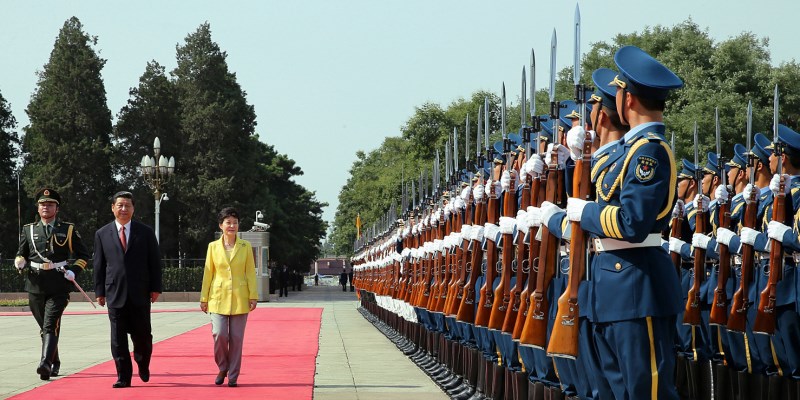China sets debt traps, threatens militarily

As China and the United States escalate their trade talks (or war?), China is carving out a disturbing global role that goes well beyond trade malfeasance. China has emerged as an old threat revived, the authoritarian seducer, I argue in the latest Human Freedom Index, published by Canada’s Fraser Institute, the U.S. Cato Institute and Germany’s Friedrich Naumann Foundation for Freedom. China uses all the seducer’s tools, charm, money, power, bribery, threats and violence.
China’s leaders, nationalistic media, and accolades around the world promote the repressive “China model” as a triumph to be adopted across the globe. Canada is a target. For example, wealthy developer Ted Jiancheng Zhou, with deep ties to the Chinese Communist Party, has become a major donor to Canadian politicians at all levels of government, raising security concerns about Chinese influence in Canadian politics.
Last year, President Xi Jinping declared that the world should adopt China’s “new type of political party system” and “the Chinese solution for tackling the problems facing mankind.” China’s media piled on damning the “chaos” of democracy and praising the Chinese model’s ability to solve “all sorts of problems”.
The “new type” model has global fans. Canadian political scientist Daniel Bell, who has taught at top U.S. and Chinese universities, has argued that China’s repressive meritocracy often produces better results than democracy and freedom. Yet, the China-model aims for unprecedented totalitarianism. China employs millions to monitor the internet and media. Digital cameras are everywhere, armed with increasingly sophisticated facial recognition tools to observe and punish anything the regime doesn’t like. Thousands of journalists, lawyers, dissidents and others have been tossed in jail.
Most disturbing is the social-credit system. It will monitor every aspect of an individual’s life and punish anything, no matter how trivial, the regime doesn’t like. Already, China has blocked 15 million citizens from train and airline trips. For those with low social-credit scores, “everywhere is limited, and it is difficult to move,” the regime brags.
The suppression of Muslim Uighurs terrifies. About a million are interned in re-education concentration camps. Executions and torture appear plentiful.
China employs its great military, economic and seductive power to advance repression internationally. Its military, with a budget three-and-a-half times that of Russia’s, aggressively enforces China’s claim to virtually all the South China Sea, threatening economic freedom globally. The world’s most important trade routes pass through the sea.
This could foreshadow horrors to come. President Xi has ordered the military to “prepare for war” in the South China Sea. The most dangerous flashpoint is Taiwan, which China claims as a renegade province. China openly threatens invasion and devastation. Officials boast of military strength and ability to overwhelm Taiwan’s defenses quickly and brutally, initiated with missile barrages to kill thousands of civilians, according to China’s military doctrine.
Back in Canada, Mr. Zhou, according to Chinese media, is honorary Chair of the Federation of Chinese Canadians for the Promotion of Chinese National Reunification, which supports China’s aim of absorbing Taiwan and extinguishing freedom.
And Chinese ambitions go beyond its neighbourhood. It subverts press freedom internationally by attacking Chinese language media globally, through economic means and by threats against family still in China. For example, China arrested the wife of Chinese-American reporter Xiaoping Chen when she passed through an airport in southern China. “Honestly, I never thought they would kidnap my wife,” Chen lamented. Senior Canadian diplomatic officials told me security forces frequently investigate threats to Chinese in Canada who question Communist Party rule.
China’s “road and belt” project is used to extend its economic power, charm and bribe dictators, promote its model and create debt traps that give China unprecedented influence including building forward military installations in places such as Sri Lanka that threaten the sovereignty of free countries. Chinese companies control 76 ports in 35 countries.
The regime dominates the “private” sector to advance its goals. Even foreign firms, along with all Chinese companies, must establish powerful communist committees that exercise authority in all aspects of activity and report back to communist authorities. Chinese law requires companies “to support, co-operate with and collaborate in national intelligence work.”
Lest anyone think China’s ambitions are limited to just most of the world, China has declared itself a “near Artic power.” It’s building Artic-able military resources and using powerful tools to create debt traps and influence on countries that border the Artic.
For too many reasons to discuss here, China’s success is fragile and likely ephemeral. As with China now, for decades, many in the west praised the success of the Soviet Union until it was proven a tragic sham. Yet, communism spread globally before the lie was exposed. Those who believe in freedom and democracy must be on-guard against the re-emergence of this old threat with its seductive authoritarians.


